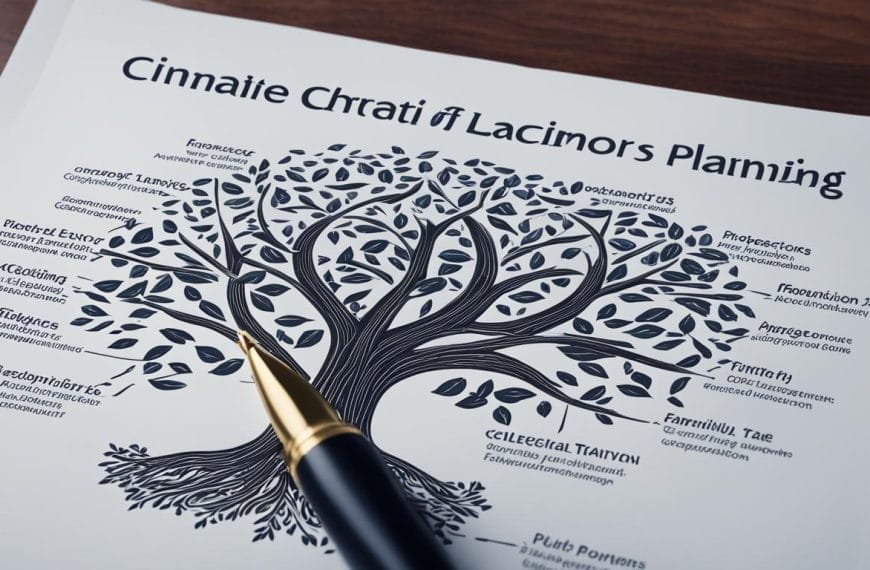Estate planning can become more complex in a second marriage, especially when there are children involved. Balancing the interests of the new spouse, the previous spouse, and the children can be a delicate task. Resolving conflicting wishes for asset distribution and dealing with tax issues also add to the challenges. The goal is to ensure a fair share of the estate for children from a previous marriage while considering the needs of the blended family as a whole.
In this article, we will explore the common challenges of estate planning in a second marriage and provide insights into the considerations and strategies for creating a fair estate plan. Whether you are navigating the complexities of remarriage and estate planning or seeking equal division of assets in a blended family, understanding the dynamics and potential pitfalls is essential.
Common Challenges of Estate Planning in a Second Marriage
When creating or revising an estate plan in a second marriage, there are several common challenges that need to be addressed. These challenges arise due to the complexities of blending families and the conflicting interests of multiple parties involved. One of the primary challenges is asset distribution. In a second marriage, there may be assets that were acquired before the marriage as well as joint assets accumulated during the marriage. Balancing the interests of the new spouse, the previous spouse, and the children from previous marriages can be a delicate task.
Conflicting wishes for asset distribution can also pose challenges. Each spouse may have different ideas about how their assets should be divided, and these conflicting wishes must be resolved to create a fair and equitable estate plan. In addition, tax issues can further complicate the estate planning process. Different tax rules and regulations may apply to different types of assets, and it is important to consider these implications when crafting an estate plan.
The well-being and future financial security of children from previous marriages is another key consideration. It is essential to ensure that their needs are adequately provided for in the estate plan. This may involve setting aside specific assets or creating trusts to protect and distribute assets to the children.
Addressing these challenges requires careful planning, open communication, and the guidance of an experienced estate planning attorney. By navigating the complexities of asset distribution, conflicting wishes, tax issues, and providing for children from previous marriages, a fair and comprehensive estate plan can be created to protect the interests of all parties involved.
Challenges of Estate Planning in a Second Marriage:
- Balancing the interests of multiple parties
- Resolving conflicting wishes for asset distribution
- Dealing with tax issues
- Ensuring a fair share of the estate for children from a previous marriage
Considerations for Second Marriage Estate Planning in Tennessee
When it comes to estate planning in Tennessee, there are specific considerations that individuals in a second marriage need to keep in mind. Understanding the state’s laws and regulations related to estate planning is crucial to ensure that your assets are distributed according to your wishes.
Estate Tax Implications:
One important consideration is the potential impact of estate taxes on your estate. Tennessee does not currently have a state-level estate tax, but federal estate tax laws still apply. It is essential to consult with an estate planning attorney to understand how these taxes might affect your plan.
Creating a Will:
A key component of estate planning is creating a will. In a second marriage, a will allows you to outline how you want your property and assets to be distributed after your death. This can help ensure that your wishes are followed and that your loved ones are provided for.
Establishing Trusts:
In addition to a will, establishing trusts can be beneficial in second marriage estate planning. Trusts can help preserve and distribute assets while providing protection and control over how they are handled. They can be particularly crucial when there are children from previous marriages involved.
Considering Prenuptial Agreements:
Another consideration in second marriage estate planning is the use of prenuptial agreements. These agreements can help clarify property division in the event of death or divorce, providing peace of mind and protecting the interests of both spouses.
Prenuptial Agreement Example
| Assets | Spouse 1 | Spouse 2 |
|---|---|---|
| Real Estate | 50% | 50% |
| Investment Accounts | 60% | 40% |
| Retirement Accounts | 50% | 50% |
Example of a prenuptial agreement that outlines the division of assets between spouses in a second marriage.
By considering these key aspects of second marriage estate planning in Tennessee – estate tax implications, wills, trusts, and prenuptial agreements – individuals can ensure that their assets are protected and distributed according to their wishes. Consulting with an experienced estate planning attorney is crucial to navigate the complexities of estate planning in Tennessee and to create a comprehensive plan tailored to your specific needs.
What is Fair in a Second Marriage and Estate Planning?
Determining what is considered fair in a second marriage and estate planning can vary depending on the specific circumstances. It is important to balance the interests of all parties involved, including the surviving spouse and children from a previous marriage. Here are some key considerations to ensure fairness:
Providing for the Surviving Spouse
One important aspect of fair estate planning in a second marriage is providing for the surviving spouse. This includes ensuring they have enough financial support to maintain their standard of living after the spouse’s death. It may involve setting up a trust or giving them the right to live in the family home.
Protecting Children from Previous Marriage
Another crucial consideration is protecting the interests of children from a previous marriage. It is fair to ensure that they receive a fair share of the estate and are not disinherited by the surviving spouse. This can be achieved through the use of trusts, specific bequests, or other estate planning strategies.
Considering Prenuptial Agreements
Prenuptial agreements can play a significant role in establishing fairness in a second marriage. These agreements can outline the rights and responsibilities of each spouse regarding property division, spousal support, and the inheritance rights of children from previous relationships.
Tax Implications
Tax implications should also be considered in second marriage estate planning to ensure fairness. Different tax rules may apply to spouses and children from previous marriages, and it is important to understand how these laws can impact the distribution of assets and minimize potential tax liabilities.
By taking these factors into account and working with an experienced estate planning attorney, you can create a comprehensive plan that promotes fairness in a second marriage and protects the interests of all parties involved.
Key Considerations for Fair Estate Planning in a Second Marriage
| Consideration | Solutions |
|---|---|
| Providing for the Surviving Spouse | Setting up a trust, giving the right to reside in the family home |
| Protecting Children from Previous Marriage | Using trusts, specific bequests, or other estate planning strategies |
| Considering Prenuptial Agreements | Outlining property division, spousal support, and inheritance rights |
| Tax Implications | Understanding tax laws and minimizing potential tax liabilities |
Considerations for Second Marriage Estate Planning
When planning an estate in a second marriage, there are several important considerations to take into account. These include:
- Providing for children from a previous marriage: It is crucial to ensure that your estate plan includes provisions for your children from a previous marriage. This may involve designating specific assets or setting up trusts to protect their inheritance.
- Addressing disparate incomes between spouses: When there is a significant difference in income between spouses, it is important to consider how this may impact the division of assets and the financial support provided to each spouse.
- Considering the age difference in the marriage: The age difference between spouses can impact estate planning decisions, especially when it comes to retirement accounts and Social Security benefits. It is essential to understand the implications and optimize the distribution of assets accordingly.
- Understanding Social Security eligibility and benefits: Social Security benefits can be an essential source of income for retirees. It is important to understand the eligibility rules and how they may be impacted by a second marriage, especially if one or both spouses have previous marriages.
- Updating beneficiaries on retirement accounts: It is crucial to review and update the beneficiaries on your retirement accounts, such as 401(k)s or IRAs, to ensure that they align with your wishes in the event of your passing. Failure to update beneficiaries may result in unintended consequences.
By considering these factors and working with an experienced estate planning attorney, you can develop a comprehensive plan that addresses the unique challenges of a second marriage and provides for the needs of all parties involved.
Retirement Accounts Considerations
| Retirement Account | Considerations |
|---|---|
| 401(k) | Review and update beneficiaries regularly. |
| IRA | Consider tax implications and distribution options. |
| Defined Benefit Plan | Understand survivor benefits and any potential reduction due to remarriage. |
Thinking Through Estate Planning in a Second Marriage
Estate planning in a second marriage is a complex process that requires careful consideration of various factors. To ensure the well-being of all parties involved, it’s crucial to address the unique dynamics and challenges that arise in these situations.
One important consideration is the well-being of children from previous marriages. In a blended family, it’s essential to plan for their financial security and future. This can be achieved by setting up wills and trusts that clearly outline their inheritance and guardianship plans.
Another factor to take into account is the potential disparity in incomes between spouses. When one spouse earns significantly more than the other, it’s important to create an estate plan that balances the distribution of assets to ensure fairness.
Moreover, the age difference in a second marriage can have implications for estate planning. It’s important to consider factors such as retirement accounts, Social Security benefits, and healthcare needs. By taking these factors into account, you can tailor your estate plan to meet the specific needs of each spouse.
To navigate these complexities, open and honest communication with your spouse is vital. Discuss your goals, concerns, and expectations regarding estate planning. It’s recommended to consult with an experienced estate planning attorney who can guide you through the process and ensure that your plan is legally sound.
Key Considerations for Estate Planning in a Second Marriage:
- Ensure the well-being of children from previous marriages through wills and trusts
- Balance asset distribution considering disparate incomes between spouses
- Address the unique needs and challenges associated with age differences in the marriage
- Engage in open and honest communication with your spouse
- Consult with an experienced estate planning attorney
By carefully considering these factors and working together, you can create an estate plan that protects the interests of both spouses while ensuring the well-being of the children from previous marriages.
Remember, estate planning in a second marriage is a highly personal and individualized process. What works for one couple may not work for another. It’s essential to tailor your estate plan to address your specific circumstances and ensure that your loved ones are provided for.
| Factors to Consider in Estate Planning for a Second Marriage | Recommendations |
|---|---|
| Children from previous marriages | Establish wills and trusts to outline inheritance and guardianship plans. |
| Disparate incomes between spouses | Balance asset distribution to ensure fairness. |
| Age difference in the marriage | Consider retirement accounts, Social Security benefits, and healthcare needs. |
| Open and honest communication | Discuss goals, concerns, and expectations with your spouse. |
| Consultation with an estate planning attorney | Seek guidance to ensure a legally sound plan. |
Conclusion
Estate planning plays a crucial role in second marriages to ensure the fair distribution of assets and address the needs of both spouses and children from previous relationships. It is essential to take into account the unique challenges and circumstances of each individual situation. Working with an experienced estate planning attorney can help you create a comprehensive and fair plan for the future.
By addressing concerns and balancing the interests of all parties involved, a fair estate distribution can be achieved. This involves considering the well-being of both the new spouse and the children from previous marriages. Through careful consideration of the assets, liabilities, income disparities, and age differences, you can develop an estate plan that meets everyone’s needs.
Blended family estate planning requires open and honest communication between spouses. Establishing wills, trusts, and guardianship plans can provide clarity and peace of mind. By consulting with professionals and taking necessary steps, you can ensure that your estate plan reflects your wishes and protects the financial security of your loved ones.













